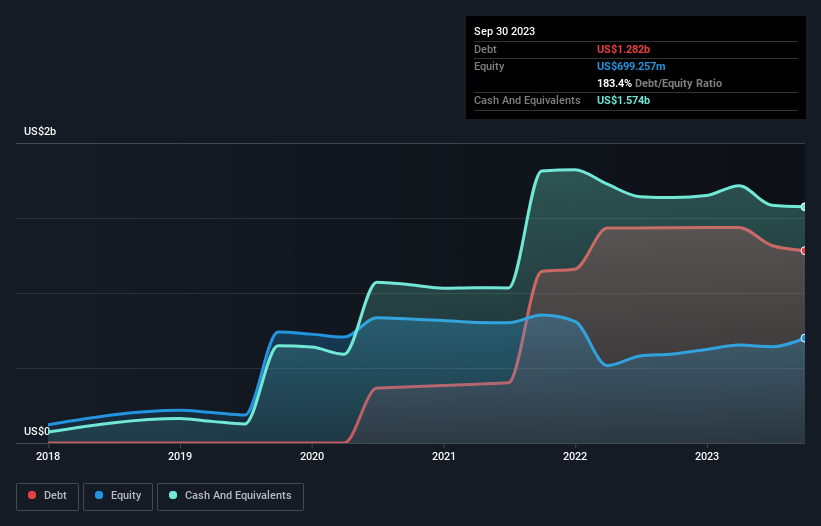
The external fund manager backed by Berkshire Hathaway's Charlie Munger, Li Lu, makes no bones about it when he says 'The biggest investment risk is not the volatility of prices, but whether you will suffer a permanent loss of capital.' So it seems the smart money knows that debt - which is usually involved in bankruptcies - is a very important factor, when you assess how risky a company is. We note that Cloudflare, Inc. (NYSE:NET) does have debt on its balance sheet. But should shareholders be worried about its use of debt?
When Is Debt A Problem?
Generally speaking, debt only becomes a real problem when a company can't easily pay it off, either by raising capital or with its own cash flow. If things get really bad, the lenders can take control of the business. While that is not too common, we often do see indebted companies permanently diluting shareholders because lenders force them to raise capital at a distressed price. Having said that, the most common situation is where a company manages its debt reasonably well - and to its own advantage. The first thing to do when considering how much debt a business uses is to look at its cash and debt together.
Check out our latest analysis for Cloudflare
What Is Cloudflare's Net Debt?
The image below, which you can click on for greater detail, shows that Cloudflare had debt of US$1.28b at the end of September 2023, a reduction from US$1.44b over a year. But it also has US$1.57b in cash to offset that, meaning it has US$291.9m net cash.

How Strong Is Cloudflare's Balance Sheet?
The latest balance sheet data shows that Cloudflare had liabilities of US$477.8m due within a year, and liabilities of US$1.41b falling due after that. Offsetting these obligations, it had cash of US$1.57b as well as receivables valued at US$248.7m due within 12 months. So its liabilities total US$67.7m more than the combination of its cash and short-term receivables.
This state of affairs indicates that Cloudflare's balance sheet looks quite solid, as its total liabilities are just about equal to its liquid assets. So while it's hard to imagine that the US$23.7b company is struggling for cash, we still think it's worth monitoring its balance sheet. Despite its noteworthy liabilities, Cloudflare boasts net cash, so it's fair to say it does not have a heavy debt load! The balance sheet is clearly the area to focus on when you are analysing debt. But it is future earnings, more than anything, that will determine Cloudflare's ability to maintain a healthy balance sheet going forward. So if you want to see what the professionals think, you might find this free report on analyst profit forecasts to be interesting.
Over 12 months, Cloudflare reported revenue of US$1.2b, which is a gain of 35%, although it did not report any earnings before interest and tax. Shareholders probably have their fingers crossed that it can grow its way to profits.
So How Risky Is Cloudflare?
While Cloudflare lost money on an earnings before interest and tax (EBIT) level, it actually generated positive free cash flow US$102m. So taking that on face value, and considering the net cash situation, we don't think that the stock is too risky in the near term. The good news for Cloudflare shareholders is that its revenue growth is strong, making it easier to raise capital if need be. But that doesn't change our opinion that the stock is risky. The balance sheet is clearly the area to focus on when you are analysing debt. However, not all investment risk resides within the balance sheet - far from it. For example - Cloudflare has 2 warning signs we think you should be aware of.
If you're interested in investing in businesses that can grow profits without the burden of debt, then check out this free list of growing businesses that have net cash on the balance sheet.
New: AI Stock Screener & Alerts
Our new AI Stock Screener scans the market every day to uncover opportunities.
• Dividend Powerhouses (3%+ Yield)
• Undervalued Small Caps with Insider Buying
• High growth Tech and AI Companies
Or build your own from over 50 metrics.
Have feedback on this article? Concerned about the content? Get in touch with us directly. Alternatively, email editorial-team (at) simplywallst.com.
This article by Simply Wall St is general in nature. We provide commentary based on historical data and analyst forecasts only using an unbiased methodology and our articles are not intended to be financial advice. It does not constitute a recommendation to buy or sell any stock, and does not take account of your objectives, or your financial situation. We aim to bring you long-term focused analysis driven by fundamental data. Note that our analysis may not factor in the latest price-sensitive company announcements or qualitative material. Simply Wall St has no position in any stocks mentioned.
About NYSE:NET
Cloudflare
Operates as a cloud services provider that delivers a range of services to businesses worldwide.
High growth potential with excellent balance sheet.
Similar Companies
Market Insights
Community Narratives



